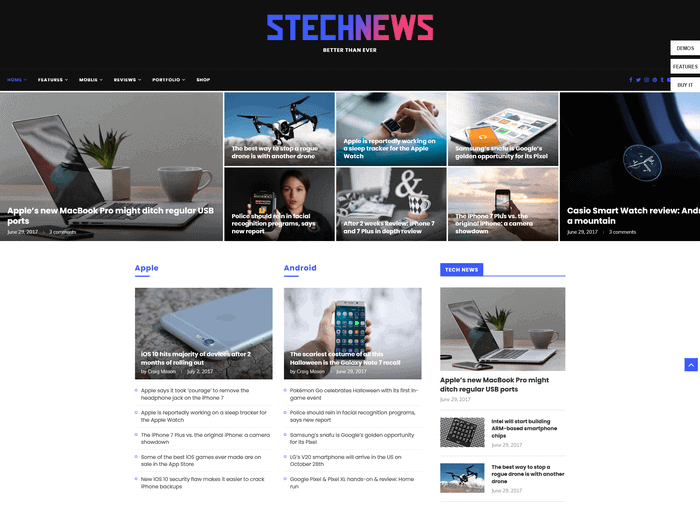Boost Your Expertise with the Best tech blog Including Industry Specialists
Boost Your Expertise with the Best tech blog Including Industry Specialists
Blog Article
Exactly How Blockchain Innovation Is Revolutionizing Data Security
Blockchain innovation is basically changing the landscape of information protection by presenting a decentralized structure that guarantees improved transparency and strength. Unlike typical systems, which rely upon centralized data repositories, blockchain disperses data across a network, minimizing susceptabilities and single factors of failure. Making use of advanced cryptographic strategies makes certain that data continues to be tamper-proof, fostering trust amongst stakeholders and individuals. As industries swiftly adjust to this modern technology, concerns occur concerning its wider influence and potential challenges. What effects does this shift hold for future data defense strategies and regulatory structures? The solutions may surprise you (Best tech blog).
The Basics of Blockchain
Blockchain technology, an innovative principle in electronic information monitoring, fundamentally changes exactly how details is saved and safeguarded. At its core, a blockchain is a distributed journal that tapes deals throughout a network of computers, guaranteeing openness and immutability. The technology operates a chain of blocks, each consisting of a listing of deals. Once a block is loaded, it is time-stamped and connected to the previous block, creating a sequential chain.
Secret to comprehending blockchain is the hashing process, which encrypts deal data into an unique alphanumeric code. This cryptographic feature ensures that any kind of modification in the purchase information results in an entirely various hash, therefore guarding against tampering. The agreement system, one more crucial part, validates and confirms brand-new transactions through a network of nodes, therefore getting rid of the requirement for a centralized authority.
Moreover, blockchain's append-only framework makes certain that data, when added, can not be deleted or changed. This particular warranties a proven and permanent document of deals, fostering depend on amongst individuals. Because of this, blockchain provides a robust structure for information honesty, using markets a reputable method for monitoring and handling electronic info in a protected, clear manner.
Decentralization and Safety And Security
Decentralization, a core concept of blockchain modern technology, significantly improves information security by distributing control across a network as opposed to depending on a particular, centralized entity. This distribution alleviates the risk of solitary points of failure, which are widespread in typical centralized systems. By spreading information throughout various nodes, blockchain makes certain that also if one node is endangered, the whole network stays safe and secure. This redundancy not just strengthens the integrity of the information but also enhances its durability to cyberattacks and system failings.

Each participant in the network has access to the entire blockchain, allowing them to confirm and investigate deals separately. Overall, decentralization is crucial in boosting data safety and security in blockchain networks.

Cryptographic Techniques
At the heart of blockchain modern technology, cryptographic methods play a critical duty in safeguarding data, making sure both confidentiality and stability. These methods are foundational to the blockchain's capability to firmly record deals in a decentralized fashion. Cryptography in blockchain employs a mix of crooked and symmetric algorithms to encrypt data, making it easily accessible just to accredited parties - Best tech blog. Public and exclusive crucial pairs are central to this process, enabling safe authentication and identification confirmation without disclosing delicate information.
Hash features are another important element, transforming input information into a fixed-size string of characters, successfully creating an unique electronic finger print for every block. This ensures that any effort to modify the information will certainly result in an entirely various hash, thus preserving the immutability of the blockchain. Electronic trademarks verify the authenticity and integrity of deals, giving a layer of non-repudiation.
The decentralized nature of blockchain, integrated with robust cryptographic techniques, removes the requirement for intermediaries, lowering possible susceptabilities. As blockchain modern technology develops, developments in cryptography such as zero-knowledge proofs and homomorphic security remain to boost security steps, additionally fortifying data security in this cutting edge electronic journal system.
Usage Cases Throughout Industries

In the health care industry, blockchain guarantees the protected storage and sharing of client records, advertising interoperability while guarding sensitive information from unauthorized access. This innovation empowers clients with control over their medical background and helps with seamless coordination among doctor.
Supply chain administration benefits significantly from blockchain's immutable ledger, which ensures traceability and credibility of items from origin to consumer. By boosting openness, blockchain assists minimize concerns such as counterfeiting and underhanded sourcing.
Additionally, blockchain's decentralized nature is improving the energy sector by enabling peer-to-peer energy trading, where customers can acquire and market excess renewable power directly. This fosters a more reliable visit the site and sustainable energy ecological community.
In the realm of intellectual residential property, blockchain provides a tamper-proof platform for designers to register and protect their works, making certain rightful attribution and go to the website reasonable payment. These diverse use cases underscore blockchain's function as a critical pressure in redefining information safety across sectors.
Future of Data Defense
As we want to the future of data defense, blockchain technology is positioned to play a critical role in securing digital info. With its decentralized and unalterable attributes, blockchain offers a robust structure for protecting sensitive information versus unauthorized gain access to and cyber risks. This modern technology ensures that when information is videotaped, it is nearly impossible to change without detection, thus offering a substantial advantage over typical data storage space techniques.
The integration of blockchain with other innovative technologies, such as artificial intelligence and the Web of Points (IoT), is expected to improve data defense methods better. By leveraging clever contracts, companies can enforce and automate safety and security procedures, minimizing human error and increasing efficiency. Additionally, blockchain's ability to supply traceable and clear deals will certainly strengthen trust fund and liability in information monitoring techniques.
As regulative landscapes evolve, blockchain's compliance-friendly nature will certainly come to be significantly appropriate. It can help companies fulfill stringent data security policies, such as the General Data Security Policy (GDPR) and the California Consumer Privacy Act (CCPA), by offering proven records of data handling activities. Ultimately, blockchain's unique attributes placement it as a transformative tool in the recurring mission to protect the electronic world versus ever-evolving cyber dangers.
Final Thought
Blockchain modern technology represents a standard check out this site change in information safety and security by leveraging decentralization and cryptographic strategies to improve transparency, count on, and information integrity. As cyber risks develop, blockchain arises as a vital device for durable data defense throughout various sectors.
Blockchain innovation is basically altering the landscape of data security by presenting a decentralized framework that promises improved openness and strength. Unlike traditional systems, which depend on centralized data repositories, blockchain disperses information throughout a network, reducing susceptabilities and solitary factors of failure.Decentralization, a core principle of blockchain innovation, significantly enhances information safety by dispersing control throughout a network instead than depending on a singular, centralized entity.At the heart of blockchain innovation, cryptographic methods play a crucial function in securing information, making certain both confidentiality and integrity.Blockchain technology represents a paradigm shift in information security by leveraging decentralization and cryptographic techniques to enhance transparency, count on, and information honesty.
Report this page